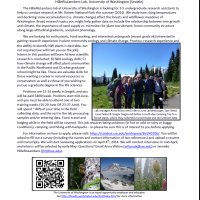Field Technicians in Freshwater Fish Ecology – University of Washington
We are looking for two field technicians to join the Freshwater Ecology and Conservation Laboratory (Dr. Julian Olden, University of Washington) to assist with a series of field projects in Washington and Oregon. Projects include the investigation of the reproductive ecology and distribution of invasive smallmouth bass in the John Day River, Oregon, and animal (fish, crayfish, snail) and plant community surveys in the Chehalis River and lakes of the Puget Sound Lowlands, Washington.
Description: Technicians will assist with extensive snorkel surveys (40+ miles of river) and the active trapping and netting of fishes in various field locations in Washington and Oregon. Other tasks will include collecting, measuring and tagging fish, collecting and measuring eggs, gathering habitat data, taking water samples and data entry. Field sites are remote (little to no cell service) and teams will be tent camping for extended periods. In general, applicants should be prepared for long working days and weeks, variable weather conditions, incredible scenery and a lot of fun.
Dates: Project dates of employment are from beginning June through mid-September, 2014.
Salary: $520/week. Field and camping equipment, food and transportation to field sites is provided.
Qualifications: Willingness and ability to work remotely in both pristine and urban aquatic systems and spend extended periods of time camping. Required attributes include: valid driver’s license, ability to lift 50lbs, ability to swim/snorkel for extended periods, and outdoor/camping experience. Preference will be given to candidates with prior experience in fish ecology. Patience with changing plans and ability to work well both independently and on a team are preferred.
To apply: send a cover letter (including dates of availability and experience), a current resume, and names and contact information for two references to esuther@uw.edu.
Deadline to apply: May 1, 2014
For more information contact:
Erika Sutherland
M.S. student, University of Washington
esuther@uw.edu
http://www.fish.washington.edu/research/oldenlab/


